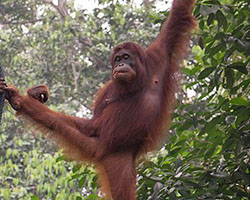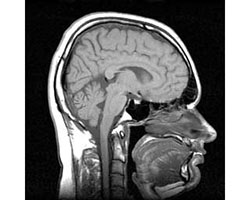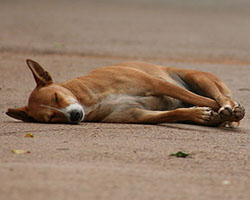show/hide words to know
Human Origins of Sleep
Scientists hypothesize that, over the course of human evolution, sleep patterns have changed as to benefit the development of high intelligence. Groups of apes that evolved earlier are thought to show sleep habits or patterns that also evolved earlier. For example, lesser apes slept on branches or on other temporary locations. This type of rest did not allow for long durations of sleep because the locations were vulnerable to predators or to other environmental disturbances.

Orangutans build nests in trees for safer, more stabilized sleeping. Image by Thomas Quine.
Sleep patterns shifted in great apes that evolved later, like orangutans, gorillas, chimpanzees and bonobos. These primates still slept in trees, but slept in bed-like structures called nests. Scientists hypothesize that the stable environment of a nest allowed great apes to experience a deeper and longer sleep. Improved sleep quality eventually led to enhanced brain function, which increased intelligence in great apes.
While nests improved sleep for the apes, sleeping in trees still limited sleep quality. Scientists propose that early humans transitioned from sleeping in trees to sleeping on the ground. This move improved the stability of their nest-- which, at this point, began to resemble a house.

Increased sleep quality enabled greater brain development in early humans. Image by Ranveig.
A highly stable nest greatly increased the duration and quality of sleep, which led to even more brain development in early humans. This brain development eventually allowed early humans to improve their cognitive abilities beyond that in other great apes. Higher quality sleep also enabled humans to sleep for a shorter part of the day, giving them more time for learning, socializing, and defending their communities.
Sleep Disorders
More recently, scientists have begun to wonder whether this evolutionary explanation of sleep can also explain some of the more common sleep problems that people have today.
Insomnia - The inability to sleep
- People with insomnia may sleep less in order to stay awake longer to watch out for predators. As they stay awake more, they can be more aware of any potential threat around them.

Humans are not the only animals that suffer from sleep disorders. For example, some dogs have narcolepsy. Image by Nagarjun.
Narcolepsy - The tendency to fall asleep during the day without the desire to do so.
- People with narcolepsy may move in to a state of unexpected sleep due to an evolutionary mechanism that causes an animal to play dead in the face of a predator. Although today’s predator for humans may be more of some environmental stressor, the remaining result (falling asleep unexpectedly) can still occur.
Seasonal Affective Disorder - Depression-like symptoms that appear during winter months
- People show the tendency to sleep more in the winter as an evolutionary tendency to conserve energy and maintain heat in cold climates.
Sleep Apnea - Difficulty breathing consistently throughout the night.
- Scientists believe this is an evolutionary mismatch disease, where humans still eat high caloric food, but are not as active compared to their ancestors, leading to obesity and other health risks that make it difficult to breathe when sleeping.
Additional images via Wikimedia Commons. Yawning baby by Solangg.
View Citation

Humans need a daily period of deep sleep to maintain health.
Be Part of
Ask A Biologist
By volunteering, or simply sending us feedback on the site. Scientists, teachers, writers, illustrators, and translators are all important to the program. If you are interested in helping with the website we have a Volunteers page to get the process started.







